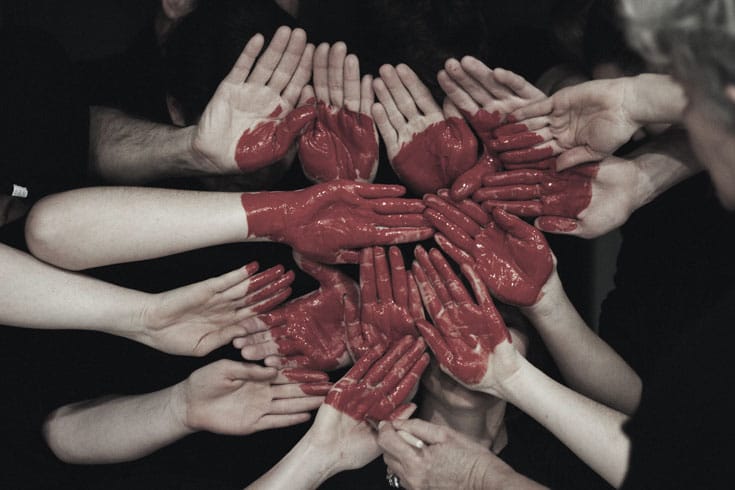A guest post by writer and psychotherapist Jennifer Hotchner on kindness as a nurturing force for our basic goodness.
Often, we believe that kindness is a trait that we learn, a behavior that we add to our personality. In fact, if we look at what makes the world go round—the kindness instinct is always there. Our growth provided by someone else’s milk. Our knowing of ourselves reflected in someone else’s eyes. Even our heartbeat is kind, and as the modern Buddhist teacher Sakyong Mipham says, everyone has one.
He also says that society starts with two people, usually one parent and one child. He says that our very survival as human beings depends on what happens between these two people. I think there’s something to that.
About two years ago someone very close to me had a five-year-old son whose best friend was shot by his father. This happened in a wealthy suburban neighborhood. The father had lost his job and was recently divorced and possibly going to lose custody of his children.
My friend cared deeply for this young boy, who’d come over for many play-dates. She told me how she learned very quickly that there were very few people that she could actually talk to about this. This was one of those experiences, too heart-wrenching, too traumatizing to look at directly. You can feel yourself turn away just hearing about it.
And what causes us to turn away? What strikes us so deeply when we see the suffering of others? Often we interpret this turning away as a lack of compassion. We are wired to avoid pain. We know this. But what about the fact that we even feel pain when confronted with someone else’s suffering? What if that were the big clue that our kindness instinct exists? What if that pain was Basic Goodness waving its flags? I am here. In this heartbreak I am here.
Rainer Maria Rilke wrote, in Letters to a Young Poet, “Perhaps everything that frightens us is, in its deepest essence, something that wants our love.”
I watched as my friend went right into the darkness of this situation blind. There was no way to know how to navigate. She helped the mother collect her son’s things. She agonized over how to communicate to her own children about what had happened. I saw how she tried to make sense of murder, and her heartbreak, over and over again. This was her chance to completely give up on humanity, and of course the question crossed her mind.
But I saw that by some miracle, like a plant somehow surviving in a dark basement, her love instead grew, taking on a fierce conviction. If she saw another child being ignored or shamed at a holiday gathering she would target them, sweep them up onto her lap, squeeze them, and whisper good things about them in their ears. I have seen her turn towards humanity with different eyes — as if she wasn’t going to give up even though she still could not understand how it came to this.
These days Sakyong Mipham talks about Basic Goodness with a sense of urgency. It is as if we are facing such critical choice points on a daily basis.
The other day I was sliding through those little squares on the bottom of my computer screen that highlight stories from Yahoo news. They’re very seductive—Cat Gets Head Stuck in a Pipe, How to Know if Your Marriage Will Fail, Man Shoots Seven People at a Local Salon, Actress Wows at Forty-seven…. (I clicked on the cat because I wanted to see what that looked like.)
I continued on to read my e-mail, and from the back of my mind one headline kept floating into view, quietly like a banner advertising death on a beautiful summer day: Man Shoots Seven People at a Local Salon. It bothered me that I skipped over this news as if it was ordinary, as ordinary as a famous actress looking hot in a blue dress. I went back and clicked on the image of the man in question wearing no shoes standing by a cop car, two women with their eyes wide in disbelief, gripping each other’s shirts with one hand and covering their sobs with the other. Stop. Look. I can feel this.
Sakyong Mipham, has made a radical claim—that all of the complicated suffering that we are seeing in the world today, all of it, has to do with how individuals feel about themselves.
I looked closely into the eyes of the man accused of murder. It was just the two of us, him locked in the computer screen, me looking on at a safe distance. This was my society.
Sakyong Mipham says that “We either choose to acknowledge our Basic Goodness, or we cower from it in fear. Society is based on what we determine it to be.”
Even being aware that we have a choice might go a long way.
